Toddler Diarrhea: What to Look For and How to Help
When your toddler experiences diarrhea, it can be a stressful time, and knowing what to look for can make all the difference. You'll want to pay attention to changes in bowel habits, stool consistency, and any signs of dehydration, like dry lips or fewer wet diapers. Understanding how to manage these symptoms effectively can ease your child's discomfort, but it's vital to know when it's time to consult a healthcare professional. So, what practical steps can you take to support your little one during this challenging period?
Common Causes of Diarrhea

Diarrhea in toddlers can stem from various common causes, and it's essential to identify them quickly.
First off, viral infections are often the main culprits. Your little one might catch a bug that leads to a tummy upset, causing those frequent trips to the potty.
Then there's the world of dietary changes. If your toddler recently tried a new food or had too much juice, their little belly might protest with diarrhea.
Another cause could be bacterial infections, often from contaminated food or water. Always remember to wash hands before meals to keep those germs at bay!
Allergies or intolerances to certain foods, like dairy or gluten, can also stir up some trouble. If you suspect this might be the case, it's worth chatting with your doctor.
Let's not forget about antibiotics! While they can be lifesavers, they might also disrupt the balance in your toddler's gut, leading to diarrhea.
Keeping an eye on your toddler's diet and habits is key. By recognizing these common causes, you can act faster and help your little one feel better. After all, nobody enjoys a messy situation!
Recognizing Symptoms in Toddlers
When your toddler has diarrhea, recognizing the accompanying symptoms can help you respond effectively. First, keep an eye on their frequency of bowel movements. If they're running to the potty more than usual, it's a sign something's up. You might also notice that the stool itself is watery or looks different than normal.
Don't forget about other symptoms, too! Does your little one seem more tired than usual? Fatigue can sneak up on them during tummy troubles.
Watch for signs of dehydration, like dry lips, a lack of tears when they cry, or fewer wet diapers. If they're acting grumpy or clingy, that could also mean they're not feeling their best. Sometimes, they might even complain of tummy aches or nausea, which can add to the fun of potty training!
It's vital to keep them comfortable and hydrated during this time. Offer plenty of fluids, like water or electrolyte drinks, to help keep them on track.
When to Seek Medical Attention
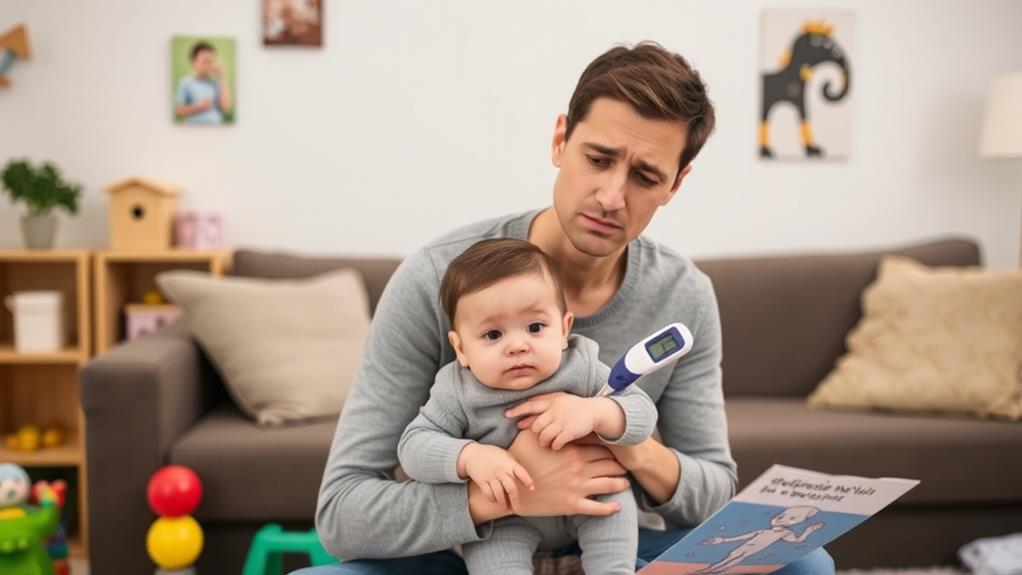
Knowing when to seek medical attention for your toddler can make all the difference in their recovery. If your little one has diarrhea that lasts more than a couple of days, it's time to call the doctor. You don't want to be stuck in a guessing game when it comes to their health.
Watch for signs of dehydration, too. If your toddler isn't drinking fluids, seems extra sleepy, or has a dry mouth, give your pediatrician a ring. Also, if you notice any blood in their stool or if they've a fever above 102°F, don't hesitate to get help.
Sometimes, toddlers can get a little dramatic, but trust your instincts. If something feels off, it's better to be safe than sorry. You know your child best, so if they're unusually fussy, cranky, or just not themselves, that's a red flag.
In short, when in doubt, reach out! It's always better to check in with a medical professional and get peace of mind. Your toddler deserves the best care, and you'll feel a lot better knowing you've done all you can to help them feel better.
Home Remedies for Relief
Finding effective home remedies can make a world of difference for your toddler during bouts of diarrhea. You want to guarantee they're comfortable and hydrated, so let's explore some simple options.
First, focus on keeping them hydrated. Offer clear fluids like water or broth. You can even try giving them an oral rehydration solution, which is like a superhero for hydration! It helps replace lost fluids and electrolytes.
Next, consider herbal teas. Chamomile or ginger tea can be soothing and help settle their tummy. Just make sure it's cool enough for them to sip safely.
Another gentle remedy is using plain, unsweetened applesauce. It's easy on the stomach and can help firm things up. You might even want to mix in some mashed bananas for extra potassium.
Lastly, keep an eye on their tummy. A warm compress can provide comfort and ease any cramps. Just remember to use it safely, so it's warm, not hot!
With these remedies, you can help your little one feel better soon. Just keep those giggles and cuddles coming—after all, laughter is the best medicine!
Dietary Adjustments to Consider
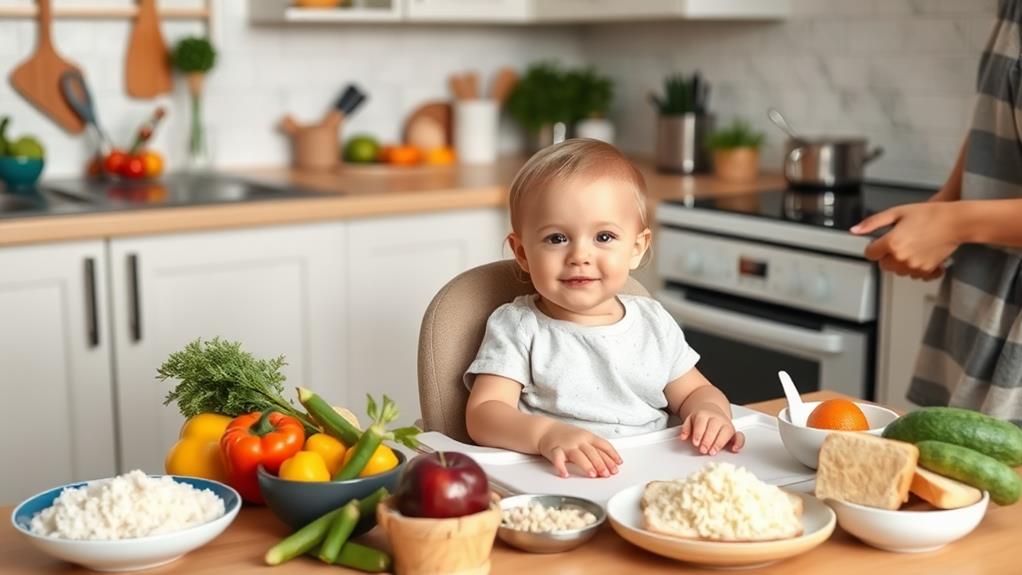
Making thoughtful dietary adjustments can greatly aid your toddler's recovery from diarrhea. Start by focusing on easy-to-digest foods like bananas, rice, applesauce, and toast—often referred to as the BRAT diet. These foods help firm up your little one's stool and provide essential nutrients without overwhelming their tummy.
You might also want to steer clear of sugary drinks and juices. They can make diarrhea worse. Instead, offer plenty of water or oral rehydration solutions to keep your toddler hydrated. Hydration's key, especially when they're losing fluids!
As your child begins to feel better, gradually reintroduce other foods. Think about adding yogurt, which has probiotics that can help restore healthy gut bacteria. Just remember to watch for any signs of intolerance or discomfort as you introduce new items.
Lastly, keep meals smaller and more frequent. This can help prevent any "food overload" that might upset your toddler's stomach. It's like trying to fit a whole watermelon in a tiny backpack—it just won't work!
With patience and these dietary adjustments, your toddler will be back to their cheerful self in no time!
Preventing Future Episodes
Consistency is key when it comes to preventing future episodes of toddler diarrhea. First, keep mealtime routines as regular as possible. Kids thrive on predictability, so try to serve meals and snacks at the same times each day. This helps their little tummies know when to expect food.
Next, focus on a balanced diet. Include plenty of fruits, veggies, whole grains, and protein, while limiting sugary snacks and drinks. Remember, your toddler's gut needs good fuel, not just candy!
Also, pay attention to food safety. Wash hands before meals and prepare food safely to avoid any stomach bugs. If your toddler is trying new foods, introduce them one at a time. This way, if something doesn't sit right, you'll know what caused the trouble.
Lastly, keep an eye on any allergies or sensitivities. If you suspect a certain food might be causing issues, don't hesitate to talk to your pediatrician. They can help you navigate your child's diet.
Understanding Hydration Needs
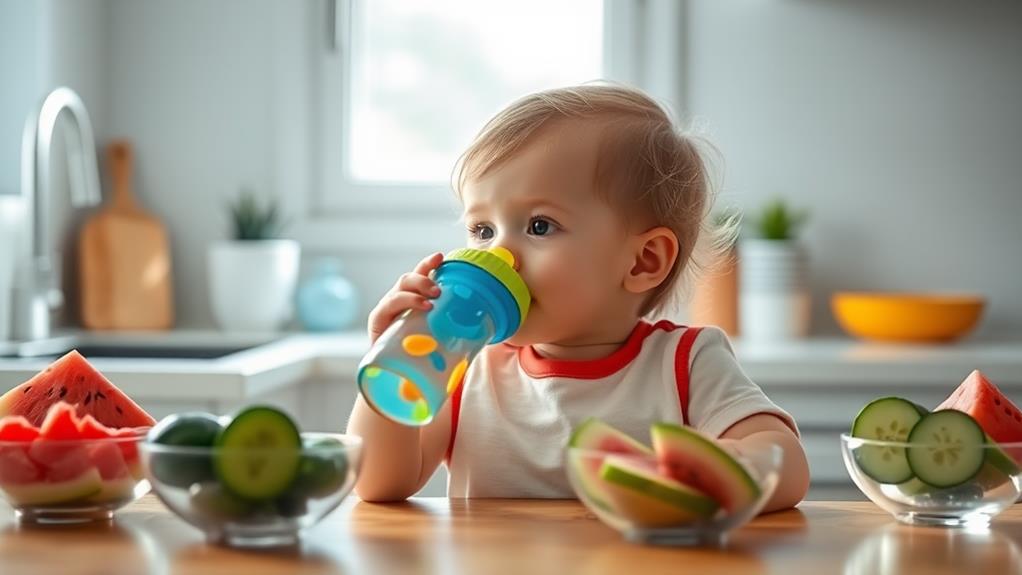
Hydration is essential for your toddler's health, especially during episodes of diarrhea. When your little one's tummy isn't happy, they lose more fluids than usual, and that can lead to dehydration. You don't want that!
So, what can you do to keep those hydration levels up?
First, offer plenty of fluids. Water is great, but you might want to take into account electrolyte solutions designed for kids. These can help replace lost salts and sugars. You can find these at your local pharmacy or grocery store, often in fun flavors that your toddler will love.
Try to get your toddler to sip small amounts frequently, rather than gulping down a big glass all at once. If they're not interested in drinking, you can offer clear broths or even popsicles made from their favorite juice—just keep an eye on the sugar content.
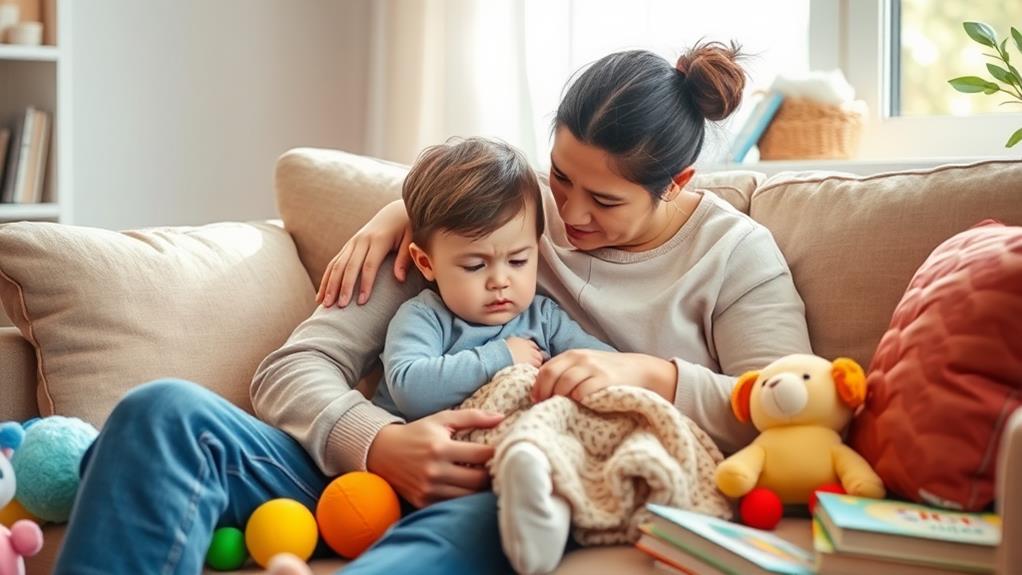
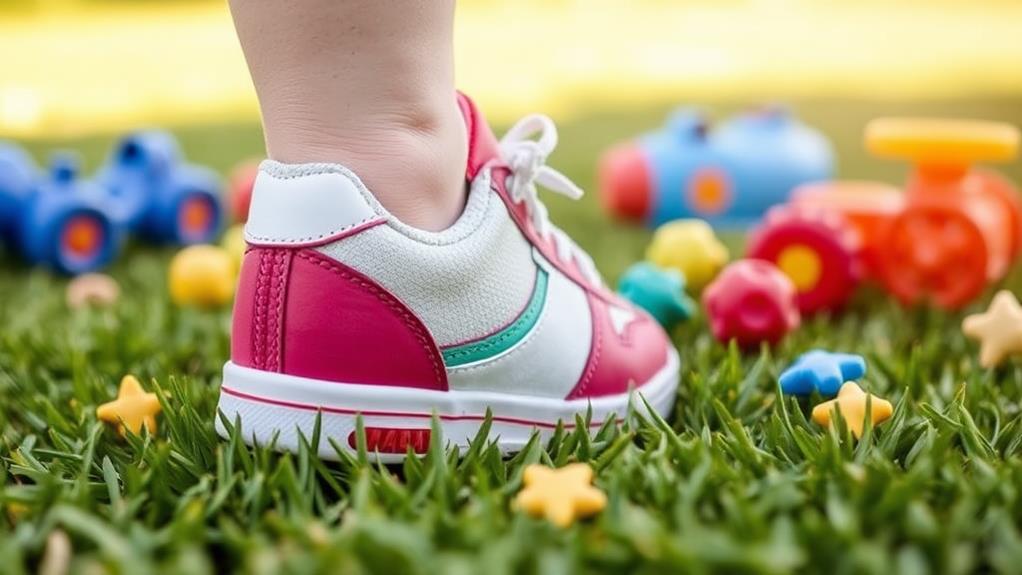











Post Comment